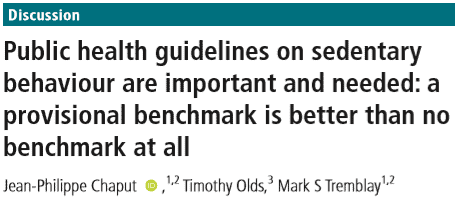
Reducing Sedentary Time among Older Adults in Assisted Living: Perceptions, Barriers, and Motivators
February 5, 2020
Is it time to have quantitative targets for sedentary behaviour guidelines?
February 18, 2020Today’s post comes from Professor Stuart Biddle of the University of Southern Queensland. More on Professor Biddle can be found at the bottom of this post.
We recently published a paper stemming from the 2018 Queensland Sedentary Behaviour Think Tank meeting. The paper is open access (https://www.mdpi.com/1660-4601/16/23/4762):
Biddle, S. J. H., et al. (2019). Controversies in the science of sedentary behaviour and health: Insights, perspectives and future directions from the 2018 Queensland Sedentary Behaviour Think Tank. International Journal of Environmental Research and Public Health, 16, 4762. doi:10.3390/ijerph16234762
The paper draws on work and discussions from a 1-day think tank meeting at the University of Southern Queensland in May 2018. Given the extensive expertise of researchers in this region, plus some international scholars who were visiting local universities and meetings, we managed to pull together a group of about 20 experts. We were interested in considering three issues that some might consider ‘controversial’, the topic of some debate, or suggestive of a new direction. These were:
- Is standing a sufficient stimulus to mitigate the detrimental health effects of prolonged sitting?
- Are there beneficial effects for breaking up sedentary time?
- Does moderate-to-vigorous physical activity attenuate the health effects of sitting?
Each topic was led by an expert with a short presentation, followed by guided discussion. A consensus document – the published paper – was then created. Throughout the process it was recognised that with such rapid change in sedentary behaviour research, it is inevitable that evidence and views will develop to become more advanced, diverse and, possibly, contentious.
The Think Tank arrived at the following conclusions:
- Standing is important. Benefits may accrue from postural shifts and these include metabolic and cardiovascular adaptations with considerable health benefits and may or may not be related to energy expenditure.
- Prolonged (mainly static) standing and prolonged sitting are both bad for health.
- Postural transitions are vital—‘the best posture is the next posture’; regularly breaking up sitting time and replacing this with postural shifts and movement is important.
- Many health effects of sitting are evident even after controlling for levels of MVPA, but those undertaking high levels of MVPA are likely to have marked attenuation of deleterious effects of high levels of prolonged sitting.
Future directions for research included an emphasis on the determinants and facilitators of standing, better knowledge concerning the dose-response effects of standing, and an examination of the underlying mechanisms of positive and negative effects of standing. Research on sitting breaks should consider how people react to certain types of messages on breaks. More is needed on causality, including the influence of other health behaviours alongside, or co-existing with, sitting (e.g., diet) and the advancement of the understanding of interrelated behaviours across a 24-h day.
The Think Tank proved to be a valuable event bringing together a great deal of expertise. Think Tank-2 will address … well, let’s see! Involving more diverse views might be beneficial, of course, otherwise we might be accused of being in our own echo chamber.
About the author

Stuart Biddle is an expert on physical activity and sedentary behaviour from the perspective of behaviour change. His research adopts a multi-disciplinary ‘behavioural medicine’ approach concerning physical activity (getting active) and sedentary behaviour (reducing too much sitting) with a particular emphasis on the measurement, prevalence, correlates and behaviour change elements of sedentary behaviour. In addition, he has interests in active living and mental health, research application (translation) and policy.



